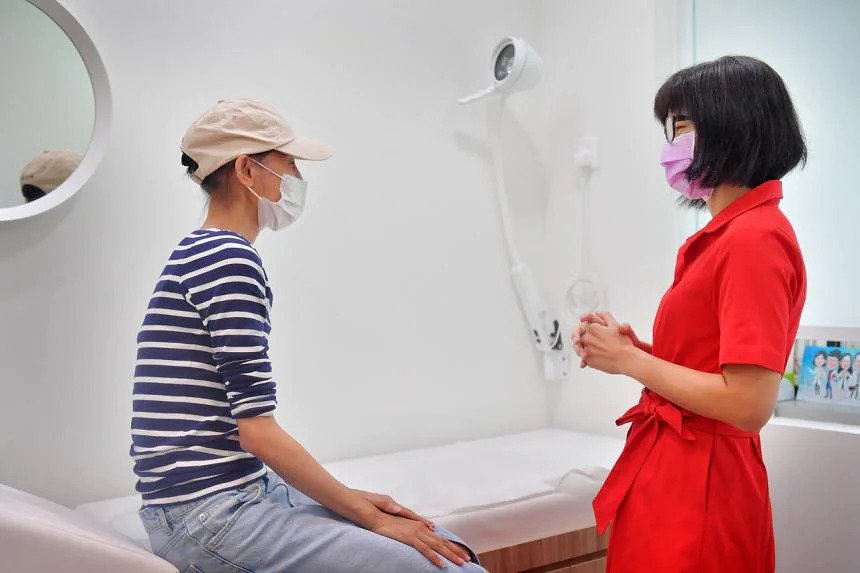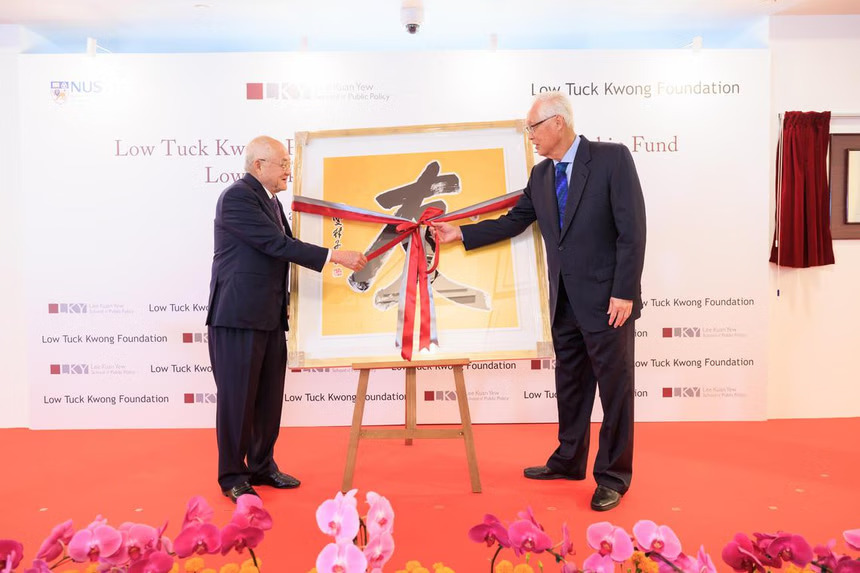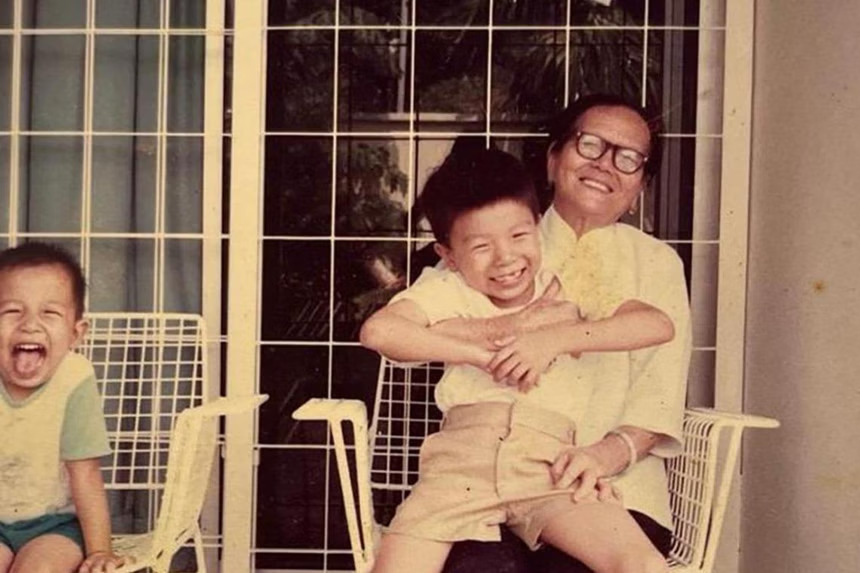‘I thought I couldn’t go through any more of it’: Cancer patient gets help after insurer says ‘no’ to $33k bill


Good Samaritans have stepped forward to help a cancer patient, who hopes to spend more quality time with her 15-year-old daughter while keeping the disease at bay.
The drug that Ms Koh Ee Miang, 45, needs to control the spread of her cancer is expensive, and her insurance company has refused to pay for it – leaving her with an outstanding bill of more than $33,000 for treatment carried out between November and January.
Hard-pressed to pay for the drug, she stopped the treatment in January and reverted to basic chemotherapy. Her cancer markers jumped 50 per cent and her tumour grew.
Her oncologist, Dr Choo Su Pin of Curie Oncology, put her back on the targeted therapy treatment and offered to let her pay in instalments. Said Dr Choo: “The treatment works. Do I stop her medicine?”
The drug not only slows the spread of the cancer, it also reduces pain and has fewer side effects than chemotherapy.
Both patient and doctor were in a quandary over the high cost of the treatment after insurers rejected the claim.
Ms Koh is a housewife who says she hopes to take her 15-year-old daughter on a holiday to leave her with “happy memories” since the prognosis for her cancer, which is fourth stage, is not good – with only 2 per cent surviving five years.
The story of her plight in The Straits Times has resulted in several offers of help.
The Community Foundation of Singapore, set up in 2008 to encourage and enable philanthropy, reached out to the Emma Yong Fund – named after one of the stars of the musical cabaret group Dim Sum Dollies, who died of stomach cancer at the age of 36 – for help.
The Fund agreed to pay the $33,000 bill that was outstanding.
Fund administrator Selena Tan said though the fund was set up to help theatre practitioners, she was happy to extend the help to Ms Koh.
“Knowing Emma’s legacy and desire to help patients with cancer, it felt right to help cover 100 per cent of Ms Koh’s medical bills so that she can focus on her treatment and recovery, and not feel distressed by her bills,” she said.
Several readers also offered smaller sums to help defray the cost.
And AstraZeneca, the pharmaceutical company that produces the Enhertu drug she now needs, has offered to provide her with it. It costs about $10,000 per treatment. However, this is subject to certain compliance issues, which Dr Choo is hoping to resolve.
A grateful Ms Koh said: “Their kindness helps me feel less alone. And just when I thought I couldn’t go through anymore of it (it has been two years of chemotherapy treatment and its side effects), they help me push on in spite of weariness.”
She would like to thank all the “generous people whom I’ve never met” for their kind offers. She will not be accepting their offers, since help from the Emma Yong Fund and AstraZeneca is enough for her to continue with the treatment.
Ms Koh suffers from a rare cancer – human epidermal growth factor receptor 2 positive (HER2+) bile duct cancer – which afflicts about one in 3,500 cancer patients.
After it was diagnosed in June 2020, Dr Choo first put Ms Koh on standard chemotherapy treatment. When she stopped responding to the treatment, a second choice was used, but this too was not able to stop the spread of the cancer.
Oncologists say there are no standard treatments beyond this.
Dr Choo decided to put her on a drug that targets the HER2 protein, which causes cancers to spread much faster, to try to contain the disease. It worked.
But Great Eastern, the insurer with whom Ms Koh has a private hospital as-charged Integrated Shield Plan (IP), as well as a rider that pays the full cost of her portion of the bill, refused to pay for the new treatment.
GE said the IP contract has a clause saying it covers only drugs that have been approved for specific illnesses. The drug she was put on has only been approved by the Health Sciences Authority for HER+ breast cancer, and not for bile duct cancer.
More than a dozen oncologists The Straits Times spoke to said it is difficult to conduct large scale clinical trials for rare cancers – since patient numbers are low. And all said they do use drugs “off-label” – meaning the drug has been approved here, but not for that specific cancer, especially for the less common cancers.
Drug companies often feel the returns are not worth the cost and work required to seek approvals from regulators for such low numbers.
Dr Choo, who was chief of Gastrointestinal Oncology at National Cancer Centre Singapore before leaving for private practice in 2018, said there are some small-scale studies showing that the drug does work on the type of cancer Ms Koh has.
Insurers offering IP plans, which are integrated with MediShield Life, are divided on coverage of drugs which doctors think might help, but which are not specifically approved by the HSA.
At least three – AIA, Income and AXA – say they would cover such drugs. The Ministry of Health (MOH) said the basic MediShield Life national health insurance would also pay, subject to a monthly cap of $3,000.
This article was originally published in The Straits Times here. Source: The Straits Times © SPH Media Limited. Permission required for reproduction.
Good Samaritans have stepped forward to help a cancer patient, who hopes to spend more quality time with her 15-year-old daughter while keeping the disease at bay.
The drug that Ms Koh Ee Miang, 45, needs to control the spread of her cancer is expensive, and her insurance company has refused to pay for it – leaving her with an outstanding bill of more than $33,000 for treatment carried out between November and January.
Hard-pressed to pay for the drug, she stopped the treatment in January and reverted to basic chemotherapy. Her cancer markers jumped 50 per cent and her tumour grew.
Her oncologist, Dr Choo Su Pin of Curie Oncology, put her back on the targeted therapy treatment and offered to let her pay in instalments. Said Dr Choo: “The treatment works. Do I stop her medicine?”
The drug not only slows the spread of the cancer, it also reduces pain and has fewer side effects than chemotherapy.
Both patient and doctor were in a quandary over the high cost of the treatment after insurers rejected the claim.
Ms Koh is a housewife who says she hopes to take her 15-year-old daughter on a holiday to leave her with “happy memories” since the prognosis for her cancer, which is fourth stage, is not good – with only 2 per cent surviving five years.
The story of her plight in The Straits Times has resulted in several offers of help.
The Community Foundation of Singapore, set up in 2008 to encourage and enable philanthropy, reached out to the Emma Yong Fund – named after one of the stars of the musical cabaret group Dim Sum Dollies, who died of stomach cancer at the age of 36 – for help.
The Fund agreed to pay the $33,000 bill that was outstanding.
Fund administrator Selena Tan said though the fund was set up to help theatre practitioners, she was happy to extend the help to Ms Koh.
“Knowing Emma’s legacy and desire to help patients with cancer, it felt right to help cover 100 per cent of Ms Koh’s medical bills so that she can focus on her treatment and recovery, and not feel distressed by her bills,” she said.
Several readers also offered smaller sums to help defray the cost.
And AstraZeneca, the pharmaceutical company that produces the Enhertu drug she now needs, has offered to provide her with it. It costs about $10,000 per treatment. However, this is subject to certain compliance issues, which Dr Choo is hoping to resolve.
A grateful Ms Koh said: “Their kindness helps me feel less alone. And just when I thought I couldn’t go through anymore of it (it has been two years of chemotherapy treatment and its side effects), they help me push on in spite of weariness.”
She would like to thank all the “generous people whom I’ve never met” for their kind offers. She will not be accepting their offers, since help from the Emma Yong Fund and AstraZeneca is enough for her to continue with the treatment.
Ms Koh suffers from a rare cancer – human epidermal growth factor receptor 2 positive (HER2+) bile duct cancer – which afflicts about one in 3,500 cancer patients.
After it was diagnosed in June 2020, Dr Choo first put Ms Koh on standard chemotherapy treatment. When she stopped responding to the treatment, a second choice was used, but this too was not able to stop the spread of the cancer.
Oncologists say there are no standard treatments beyond this.
Dr Choo decided to put her on a drug that targets the HER2 protein, which causes cancers to spread much faster, to try to contain the disease. It worked.
But Great Eastern, the insurer with whom Ms Koh has a private hospital as-charged Integrated Shield Plan (IP), as well as a rider that pays the full cost of her portion of the bill, refused to pay for the new treatment.
GE said the IP contract has a clause saying it covers only drugs that have been approved for specific illnesses. The drug she was put on has only been approved by the Health Sciences Authority for HER+ breast cancer, and not for bile duct cancer.
More than a dozen oncologists The Straits Times spoke to said it is difficult to conduct large scale clinical trials for rare cancers – since patient numbers are low. And all said they do use drugs “off-label” – meaning the drug has been approved here, but not for that specific cancer, especially for the less common cancers.
Drug companies often feel the returns are not worth the cost and work required to seek approvals from regulators for such low numbers.
Dr Choo, who was chief of Gastrointestinal Oncology at National Cancer Centre Singapore before leaving for private practice in 2018, said there are some small-scale studies showing that the drug does work on the type of cancer Ms Koh has.
Insurers offering IP plans, which are integrated with MediShield Life, are divided on coverage of drugs which doctors think might help, but which are not specifically approved by the HSA.
At least three – AIA, Income and AXA – say they would cover such drugs. The Ministry of Health (MOH) said the basic MediShield Life national health insurance would also pay, subject to a monthly cap of $3,000.
This article was originally published in The Straits Times here. Source: The Straits Times © SPH Media Limited. Permission required for reproduction.
- Related Topics For You: DIRECT AID, DONOR STORIES, DONOR-ADVISED FUND, HEALTH, NEWS, STORIES OF IMPACT



